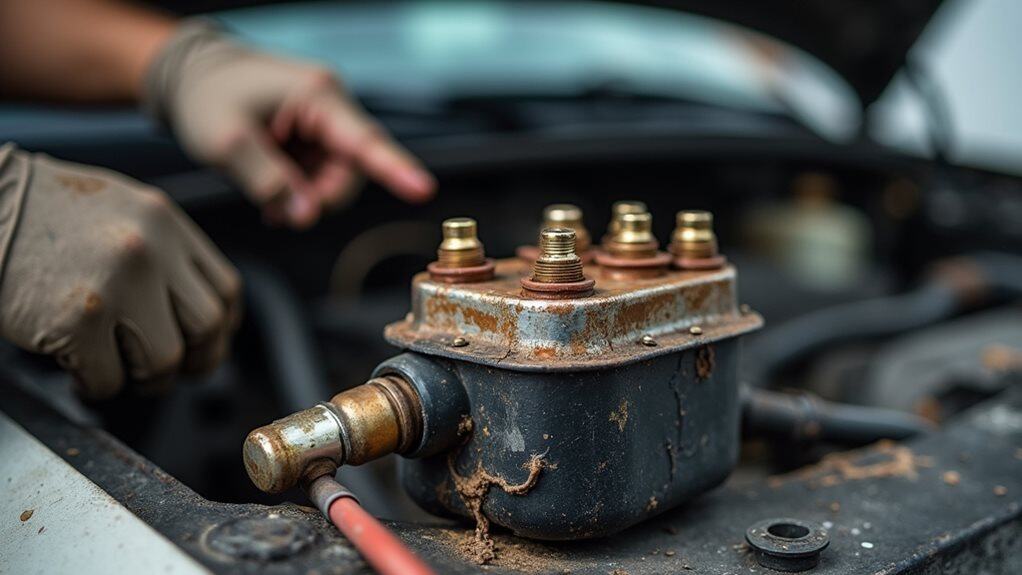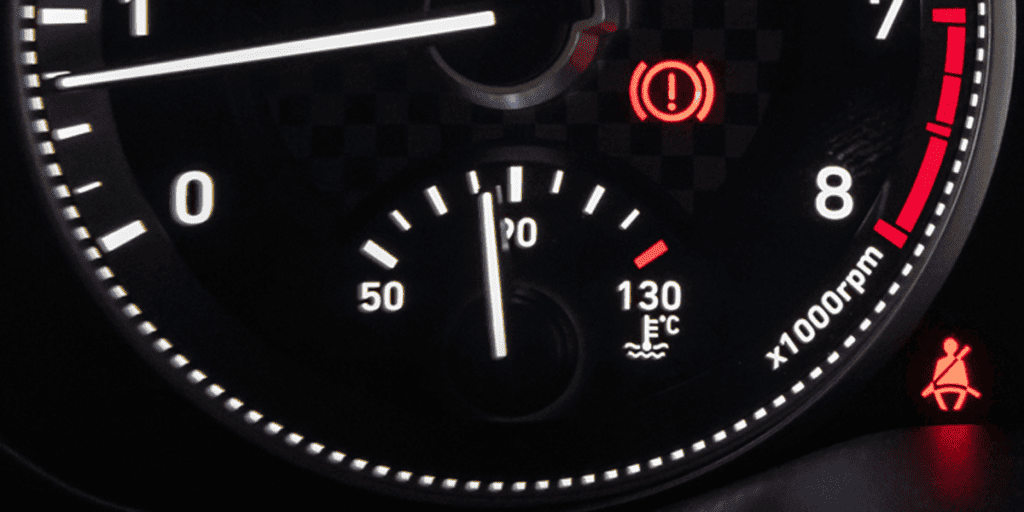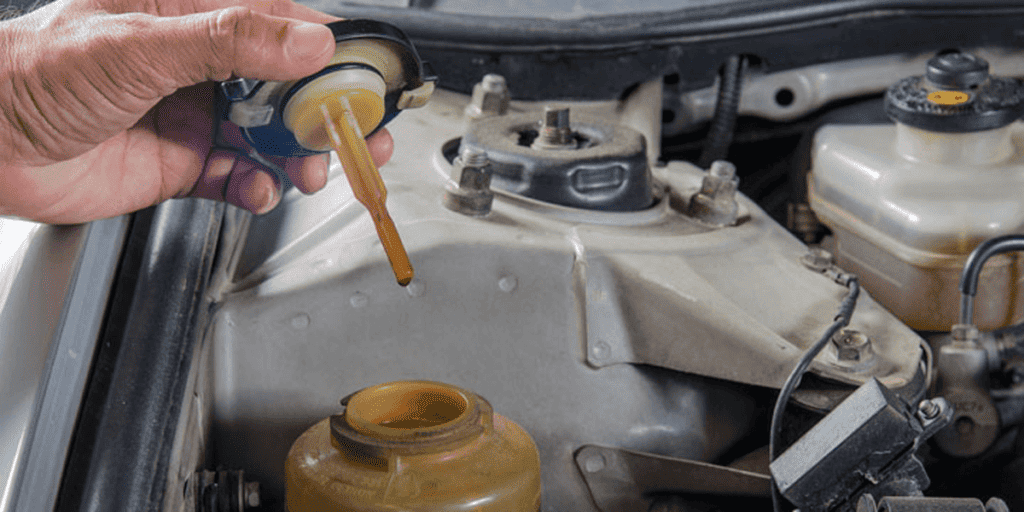You’ll notice a bad pickup coil as intermittent or total loss of spark that causes stalling and sudden shut‑offs, hard or no starts, and repeated cranking attempts. You’ll get misfires, irregular ignition timing, rough idle, and vibrations as cylinders fire unevenly. Under load you may see reduced power, poor acceleration, backfiring, black smoke, or a strong fuel smell, risking the catalytic converter. Check coil waveforms and wiring for intermittent faults, and keep going to learn diagnostic steps.
Quick Tips
- Intermittent engine stalling or sudden shut-offs due to loss of ignition trigger signal.
- Difficulty starting or no-starts from weak or absent spark during cranking.
- Irregular ignition timing and noisy trigger pulses causing misfires and timing disruptions.
- Rough idle, increased engine vibration, and frequent misfire codes at low RPM.
- Reduced power, poor acceleration, backfiring, and strong fuel smell from unburned fuel.
Engine Stalling and Sudden Shut-Offs

If the pickup coil in your distributor starts failing, the ignition system can lose its trigger signal intermittently and your engine may stall or shut off without warning.
You’ll experience abrupt shutdowns as sparks stop, causing combustion to cease.
The vehicle may restart briefly, but misfires and timing disruptions return; inspect or replace the pickup coil promptly to restore consistent ignition. Poor electrical connections or a weak battery can worsen this condition by preventing the coil from receiving adequate power, so check the battery connections.
This fault can also cause engine misfires, rough idling, and reduced fuel economy.
Difficulty Starting or No-Start Conditions
After stalling or sudden shut-offs, the next symptom you’ll often notice is difficulty getting the engine to start, or a complete no-start condition caused by a failing pickup coil.
You’ll crank the engine but get weak or no spark, needing multiple attempts; in single-coil systems this can mean total no-start.
Intermittent pickup signals produce sputtering starts and skipped cylinders.
A failing pickup coil can mimic starter or engine issues by causing no cranking or repeated unsuccessful start attempts due to weak or absent spark.
Irregular Ignition Timing and Signal Loss

You’ll notice erratic timing signals when the pick up coil sends inconsistent or noisy pulses to the ignition module, which makes the spark occur at the wrong moments and causes misfires or rough running.
If the coil intermittently loses its trigger output, the ignition can cut out briefly or entirely, producing stalls, sudden power loss, or no-start conditions depending on whether the signal drop is partial or complete.
Check for irregular waveform patterns with a scope or a fluctuation in live ignition timing data, since those readings will help you distinguish pick up coil signal loss from other ignition or sensor faults.
Also inspect nearby wiring and protective components, since a damaged harness or a blown fusible link can cause similar intermittent signal loss.
Erratic Timing Signals
When a pickup coil begins to fail, its voltage output can fluctuate and give the ignition system irregular trigger pulses, so the spark timing becomes unstable and your engine’s combustion events no longer occur at consistent crank angles.
You’ll notice rough idle, hesitation, surging, or backfire as timing advances or delays unpredictably.
Use an oscilloscope or timing light to confirm erratic trigger pulses.
Intermittent Trigger Loss
Erratic timing signals often foreshadow a more severe problem: intermittent trigger loss from the pickup coil, which causes the ignition to cut out unexpectedly and the engine to stall or misfire.
You’ll notice sudden shutdowns that mimic a key-off event, rough idle, and sporadic restarts; test the coil signal with an oscilloscope, replace a failing pickup coil, and recheck timing to restore reliable ignition.
Rough Idle and Engine Vibrations
When a pickup coil starts failing, you’ll often notice uneven cylinder firing that makes the engine run rough at idle, because one or more cylinders aren’t getting a consistent spark.
This uneven firing produces idle shakes and perceptible vibration, and in more severe cases the engine can stumble or stall when you’re stopped.
Check for misfire codes, inspect coil connectors for corrosion or heat damage, and test coil continuity to confirm whether the pickup coil is causing the problem.
A failing pickup coil can also lead to engine stalling if the ignition system doesn’t receive enough reliable current.
Uneven Cylinder Firing
Often you’ll notice a rough idle and vibrations when a failing pick up coil causes uneven cylinder firing, because the coil controls the timing and strength of the spark that ignites each cylinder’s air-fuel mixture.
You’ll feel jerking or sputtering as one or more cylinders misfire, reducing power and efficiency; intermittent spark timing creates unbalanced combustion, harsher vibrations, and increased engine strain.
Idle Shakes and Stalls
You’ll notice the engine trembling or hiccuping at idle when a failing pick-up coil is disrupting spark delivery, because the coil’s role is to time and trigger the ignition pulses that keep each cylinder firing smoothly; at low RPM any irregularity in those pulses becomes much more noticeable, producing vibrations and audible sputtering.
You’ll feel shakes, RPM swings, and possible stalls as weak or intermittent spark interrupts combustion, increasing wear and risking shutdown until the coil or wiring is inspected and repaired.
Misfires, Reduced Power, and Poor Acceleration

Because a faulty pick up coil directly affects the ignition system, you’ll notice a clear pattern of misfires, reduced power, and poor acceleration that trace back to weak or inconsistent spark delivery.
You’ll feel rough idling, jerks or sputters under load, and sluggish throttle response; the engine loses torque and horsepower, may trigger a check engine light, and struggles more during acceleration.
Backfiring, Exhaust Smoke, and Fuel Smell
Misfires, reduced power, and poor acceleration often point to weak spark delivery, but those same ignition problems can also cause loud backfires, visible exhaust smoke, and a noticeable smell of gasoline; these symptoms indicate that fuel is leaving the engine unburned and igniting or smoldering in the exhaust system.
If your pickup coil fails, cylinders misfire, unburned fuel creates black smoke, pungent fuel odor, and popping backfires, risking catalytic converter and pipe damage—inspect and replace faulty ignition components promptly.
Progressive Symptoms and Intermittent Thermal Failures

As the pickup coil slowly degrades, you’ll notice a clear progression of symptoms that start subtle and get worse over time: engine roughness and occasional hesitation can give way to repeated stalling, longer crank times, and an overall loss of power during acceleration.
Heat cycles often trigger intermittent failures; the coil may work when cold, then misfire, stall, or hard-start as temperature rises, indicating internal wire or insulation breakdown.
Wrapping Up
You’ll want to address a failing pickup coil promptly, because it causes stalling, hard starts, misfires, and erratic ignition signals that reduce engine performance and can leave you stranded. Inspect the ignition timing signal, check resistance and continuity with a multimeter, and watch for heat-related failures that appear only after running. Replace the coil if readings fall outside manufacturer specs, and after replacement verify smooth idle, consistent spark timing, and restored acceleration to confirm the issue is resolved.




